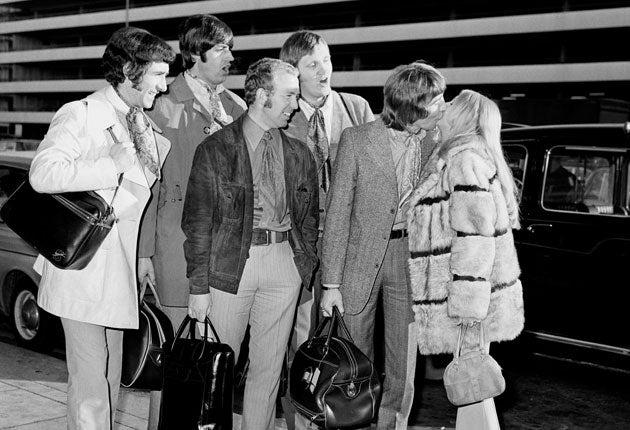Duke D'Mond: Lead singer of the Barron Knights

Duke D’Mond was the lead singer of the pop parodists the Barron Knights. They scored their major successes with pastiches of popular hits on singles each of which had a particular theme such as conscription, the Olympics or Christmas.
Born as Richard Palmer in Dunstable in 1943, D’Mond left school at 16.
His father, who had wanted to be a professional singer, worked for the printers Waterlows, and D’Mond also joined the firm as an apprentice.
In 1961 he auditioned as the lead singer for a beat group from Leighton Buzzard and soon, as the Barron Knights, they were playing local clubs around Bedfordshire as well as experiencing the gruelling work schedules of Hamburg.
They signed with a London publicist, Les Perrin, who renamed Palmer as Duke D’Mond (Duke of the World) and the rest of the band were Barron Anthony (bass), Pete Langford (guitar), Butch Baker (guitar) and Dave Ballinger (drums). With his mysterious name and striking good looks, D’Mond was the focal point, but he was, in the jargon of the day, “already taken”. He married Pauline, his childhood sweetheart, in 1964.
The Barron Knights were at the bottom of the bill on The Beatles Christmas Show in 1963, but within a few months they were a chart attraction.
They advocated the return of conscription in “Call up the Groups” so that their chart rivals would be out of the way. They experienced what was to be a recurring problem as the music publisher Dick James would not allow a rewrite of a Lennon and McCartney song and so they reworked “Twist and Shout” instead. The single, recorded for EMI, went to No 3 and they had further Top 10 hits with “Pop Go the Workers” (1965) – this time using one of the two Beatles songs not published by James, “Love Me Do” – and “Merry Gentle Pops” (1965).
Being an all-male group, part of the fun was parodying such female singers as Marianne Faithfull and Sandie Shaw. “We were never parodying the music as we thought it was great,” D’Mond told me in 1990. “I felt at the time that we were living in a wonderfully creative time for music.”
D’Mond conceded that the Barron Knights format was not as original as many thought: “The Four Preps were our idols, but nobody over here knew their records like ‘The Big Draft’ and ‘More Money for You and Me’. We were big fans and we wanted to do something similar. I also didn’t think that we were as sharp as Allan Sherman.
"He wrote his parodies as close to the original words as possible and that was both very clever and very difficult. The fact that he wasn’t much of a singer made him even funnier.”
The Barron Knights were part of a record-breaking revue with Ken Dodd at the London Palladium, which ran for six months in 1965. They were a hard-working band, endlessly touring the UK and other countries where they were successful, notably Australia.
With their middle-of-the-road comedy, they were a very popular club act, but they lacked the anarchic humour of the Bonzo Dog Band. Although they made straight pop records – including a fine version of “It Was a Very Good Year” in 1965 – these records never sold. In particular, D’Mond’s falsetto was featured on some Stylistic-styled singles in the early 1970s for the Penny Farthing label.
In 1977, the Barron Knights signed with Epic and both “Live in Trouble” (1977) and then “A Taste of Aggro” (1978) made the Top 10. They had their first hit album with Night Gallery which included full-length parodies like “Awful Séance” for “Floral Dance” and “The Chapel Lead is Missing” for “The Three Bells”. In 1979 they had some unexpected success in America with a comment on the fuel shortage, “The Topical Song”, a riff on Supertramp’s “The Logical Song”.
David Bowie’s publisher had rejected their reworking of “Space Oddity” as a conversation between two cats (“Birth Control to Ginger Tom”), but after they met Bowie on Top of the Pops, he gave permission. They were less fortunate, however, with the new musical Evita. Although no killjoys, Andrew Lloyd Webber and Tim Rice realised that they couldn’t have audiences thinking of vacuum cleaners while Elaine Page was singing “Don’t Cry for Me Argentina”.
In publicity material, D’Mond had commented that his favourite actress was Linda Lovelace. This was intended as a joke, but it suggested that there was another side to him. In 1985, he had an affair with Ruby James, a backing vocalist for Spandau Ballet.
When she broke it off, he spitefully sent glamour photos he had taken to a magazine. James successfully sued D’Mond, telling the court, “He’s an overgrown kid who thinks he’s God’s gift to women.”
D’Mond continued with the Barron Knights, always impressing audiences with the final number, “Peace in the Valley”. In 1999, they revived their parody format with “The Golden Oldie Old Folks Home” and “Hippy Hippy Shake” – now about hip replacements.
After injuring himself in a fall, D’Mond left the group in 2005, but he was still happy to sing in his local pub.
Spencer Leigh
Richard Eddie Palmer (Duke D’Mond), singer: born Dunstable, Bedfordshire 25 February 1943; married 1964 Pauline (one daughter); died Oxford 9 April 2009.
Join our commenting forum
Join thought-provoking conversations, follow other Independent readers and see their replies
Comments